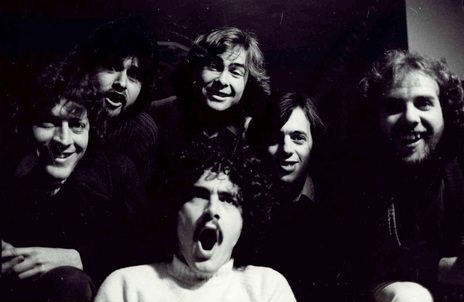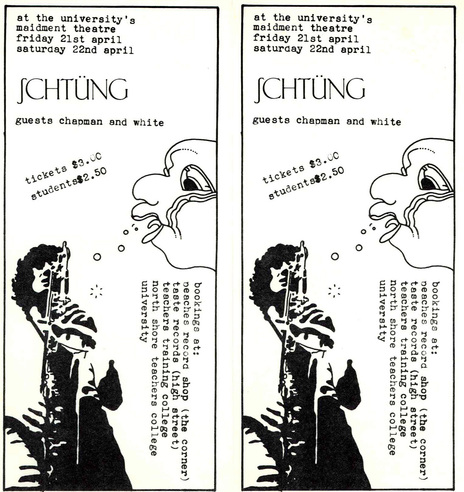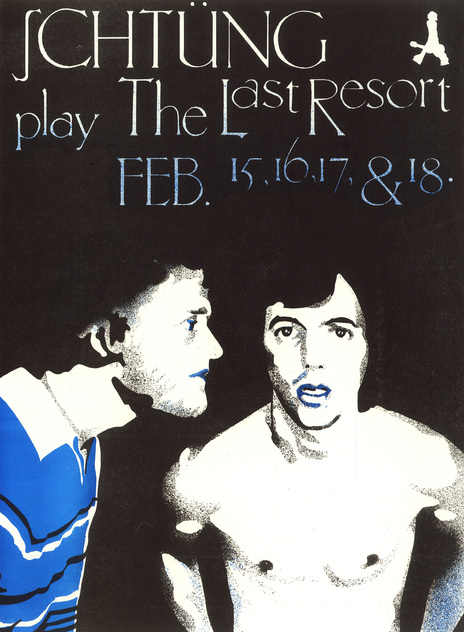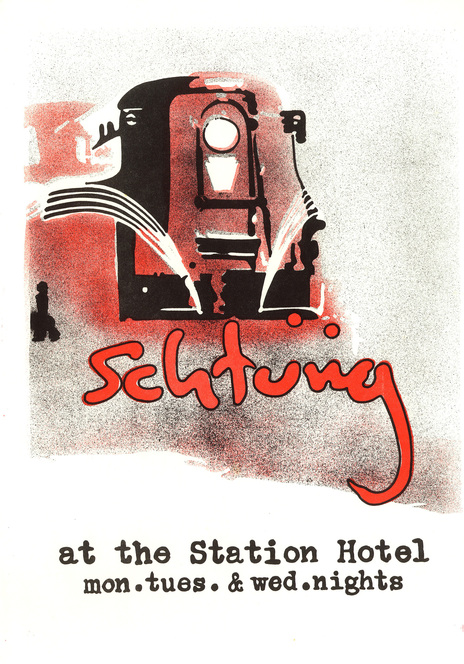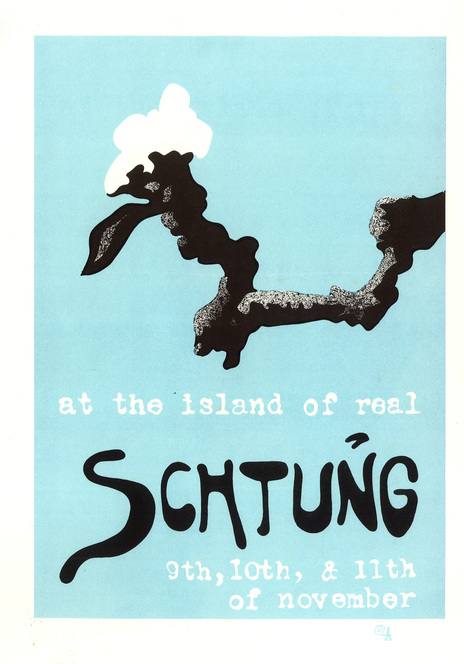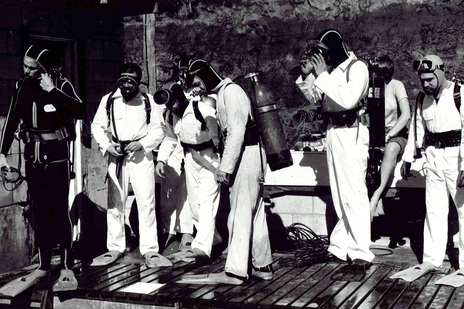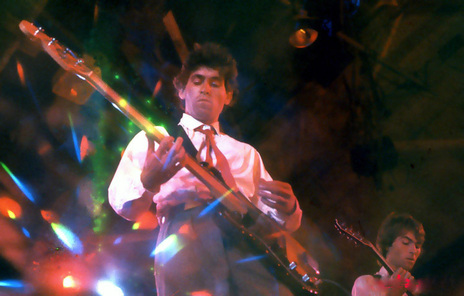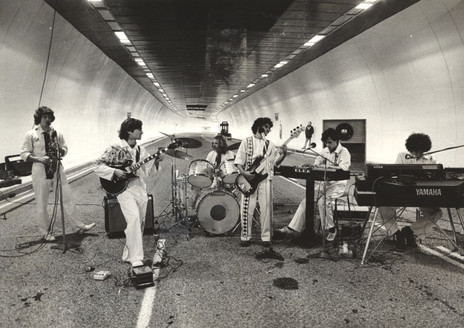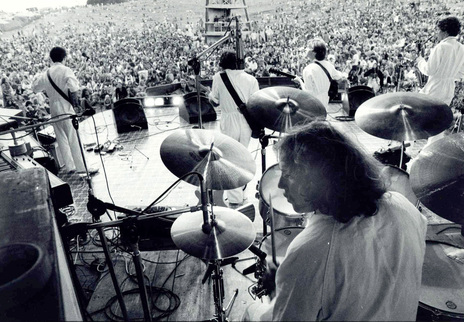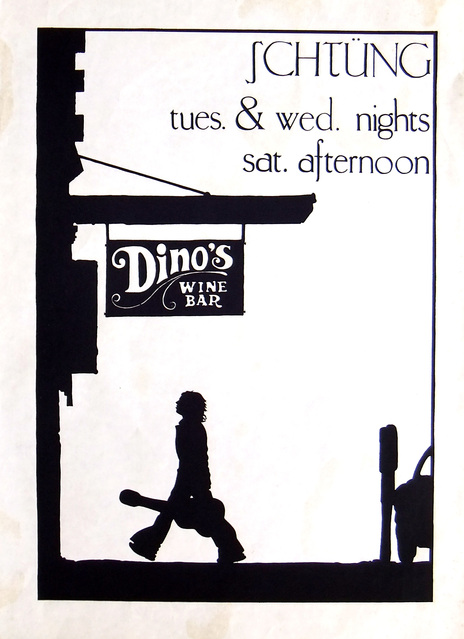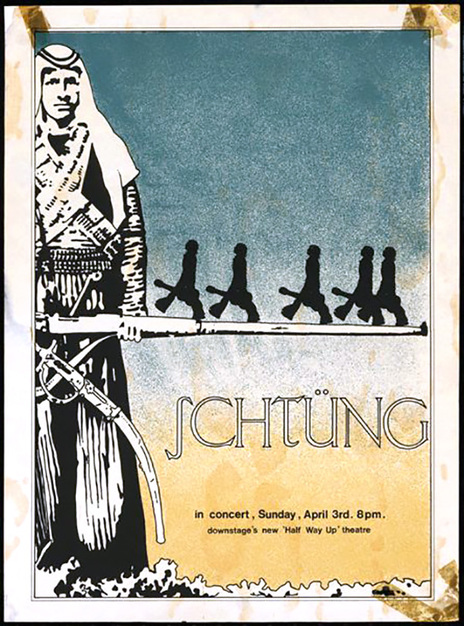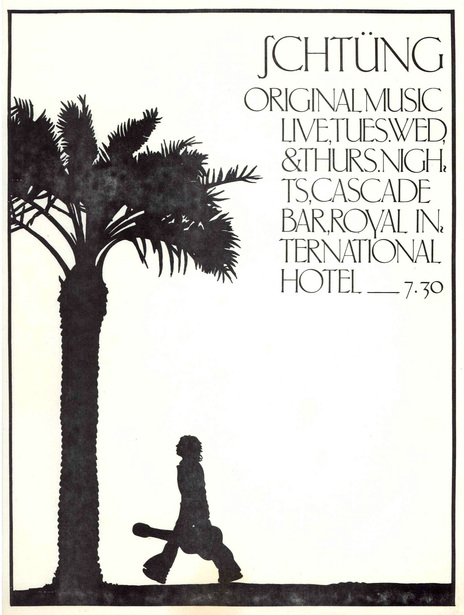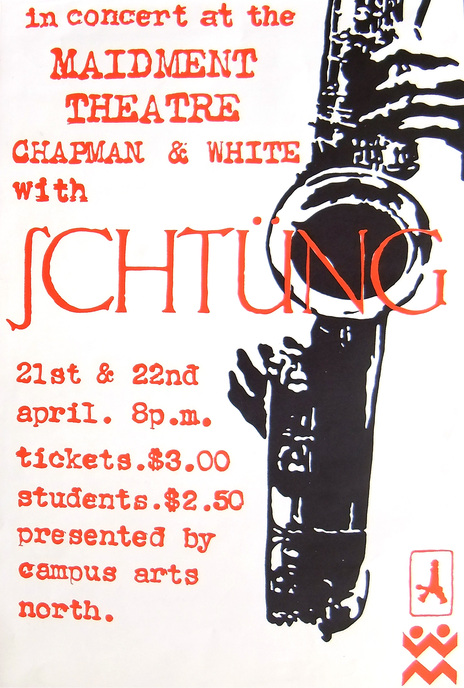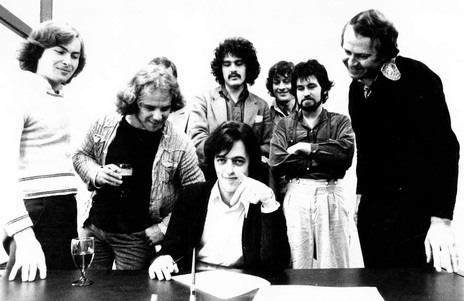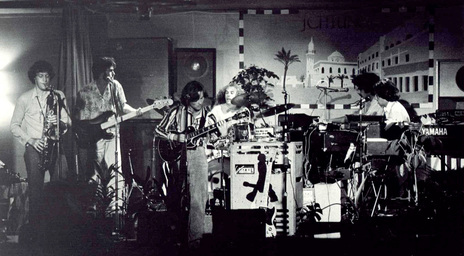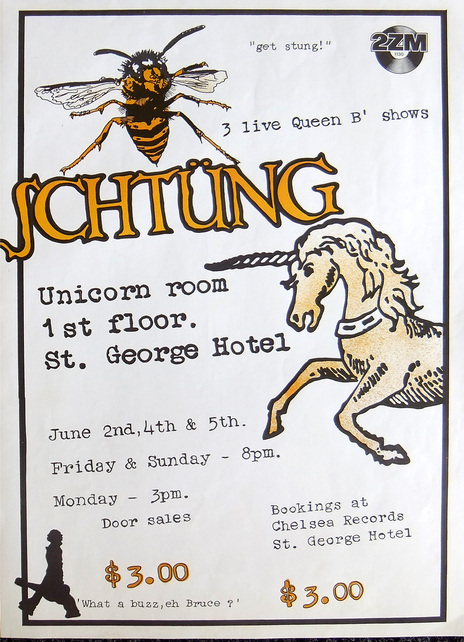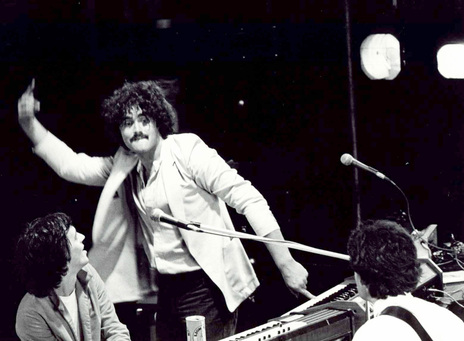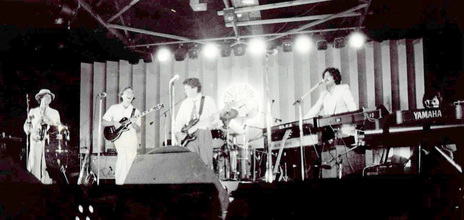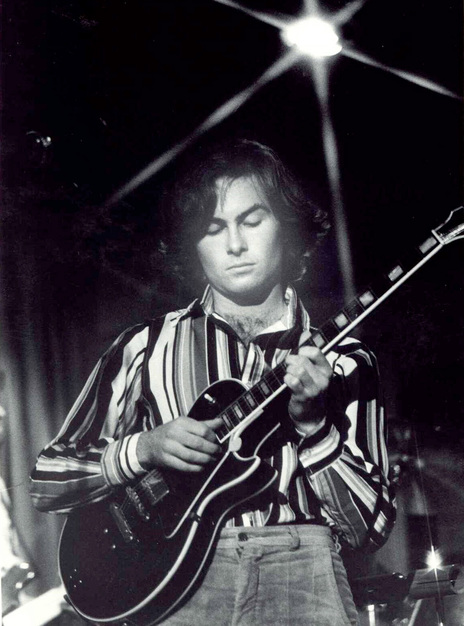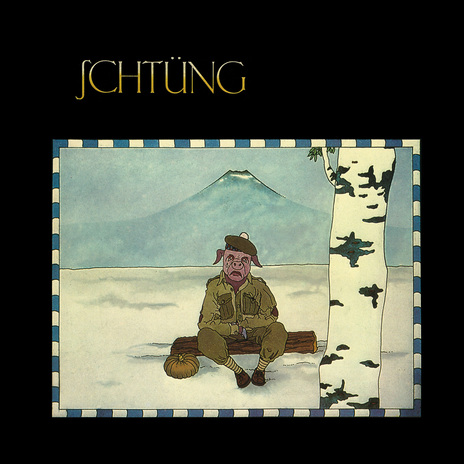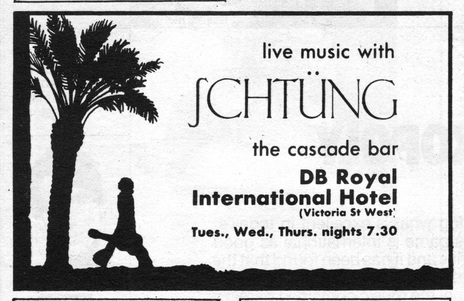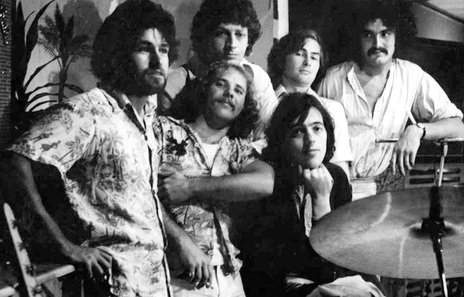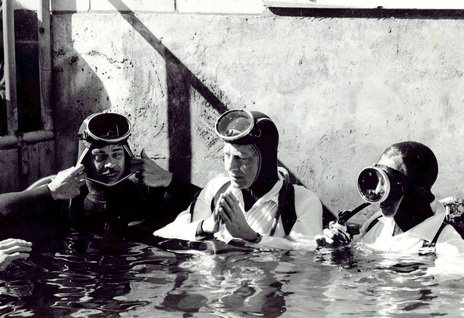Beginnings
With their rapidly expanding repertoire of songs demanding more instrumental sophistication, the pair decided a full group was required. Geoff Bowdler approached the duo when they were performing at Downstage Café. English-born Bowdler had been the drummer in 60s Manchester beat group The Vulcans before moving to New Zealand. After a few collaborations with other local musicians a fourth member – woodwind/percussionist Dave Bowater – left his group, Full Moon Express, to join up.
The four-piece then undertook a series of gigs at the Railway Hotel in Thorndon with a view to attracting other musicians. From these shows bassist Rob Sinclair and keyboards player Paul Jeffery joined to complete the line-up. Rob had pretty much flagged music following a stint with Christchurch folkies Serenity in the early 70s and Paul was employed as a vocalist-pianist covering popular singer-songwriter repertoire of the day.
The new group did not mess around. With vocals being shared by Andrew (keyboards), Paul (keyboards) and Rob (bass); and Morton (guitar) Dave (woodwind) and Geoff (drums) the band went into intense rehearsal mode at a Karori school hall. There they worked up prog-rock song-cycle epic ‘The Seven Ages Of Man’ in two weeks flat.
Entering the Battle Of The Bands, the band realised the urgent need for a name. A misheard quote from the Monty Python "Piranha brothers" sketch saw the Yiddish expression “schtum” – meaning “keep it quiet” – somehow become Schtüng.
The album
In early 1977 PolyGram head of A&R, Gerry Beyering, caught the band in concert at Wellington’s Downstage Theatre. Gerry was impressed but uncertain and at the band’s prompting settled on the band playing a live set in the PolyGram staff canteen to gauge the reaction. The staff gave the band the thumbs-up and a two-album deal was duly signed.
By now Hagen was working as a reporter at the NZBC and his confident claim that he could generate publicity for the band using inside connections was the icing on the cake for Beyering.
The self-titled album was recorded at EMI Studios in Lower Hutt with staff producer Rick White (formerly of Tom Thumb, Farmyard and Taylor) and engineer Dave Ginnane at the controls.
That only a couple of songs survived from ‘The Seven Ages Of Man’ was testimony to the prolific and fast-paced songwriting of Hagen and Wilson. Early live favourites such as ‘Waiting At The Bus Stop’ and ‘You Think It’s A Dream’ were passed over in favour of more recently written tracks.
The album displayed great instrumental prowess and heavily featured such prog staples as synthesisers and flutes.
Sinclair designed the album cover art, which featured visual elements representing each of the tracks. It was released in early-December 1977.
Influenced by such English prog-rock stars of the 70s as Supertramp and Genesis, the album displayed great instrumental prowess and heavily featured such prog staples as synthesisers and flutes. The dry wit of 10cc is reflected in the lyrics of English-born Hagen in the songs ‘National Scandal’ and ‘Doon The Dunny’.
True to his word, Hagen did his best to drum up publicity for the band. A mock underwater record deal signing for the press and TV cameras at Titahi Bay diving school saw the band and Beyering decked out in full scuba diving gear.
Then, having convinced Wellington City Council that the acoustics there were superb, Schtung played the unreleased track ‘Black Hole’ in the Terrace Motorway Tunnel the day before it opened in 1977, overshadowing the official opening on network television.
To accompany the first single from the album, ‘They Sleep Early In Cologne’ and album track ‘National Scandal’, Schtüng made some of New Zealand’s earliest music videos, using short ends from film reels at Avalon studios. The former saw the band cavorting in a convertible at Shelly Bay on the Miramar Peninsular.
Schtung live
Schtüng’s art rock sound was not exactly what landlords overseeing the nascent pub-rock circuit in New Zealand were seeking in 1977, so Schtüng got creative.
One memorable show from this stint saw a tanked–up (and intensely mellowed out) Mongrel Mob crew unexpectedly won over by the band’s performance.
The band agreed on terms with the St George Hotel in Boulcott Street to fill a regular Saturday afternoon slot at a time when most Kiwis were off watching the game and the pub was delighted to welcome anyone in need of some libation. One memorable show from this stint saw a tanked–up (and intensely mellowed out) Mongrel Mob crew unexpectedly won over by the band’s performance.
Selected gigs saw the band dressed in white boiler suits. Sinclair designed the posters advertising the band’s shows. Foreshadowing his future career Jeffery chipped in with technical innovations, designing the band’s amplification and new speakers.
An April 1977 show performed in-the-round at Downstage’s Half Way Up theatre – where the band played ‘The Seven Ages Of Man’ in its entirety accompanied by a troupe of dancers from Deidre Tarrant’s company – was the first of several multi-media collaborations.
Throughout their three-year existence, other one-off shows and recording ventures occurred, including work with theatre troupe Red Mole, the Impulse Dance Group and Auckland’s Limbs. Creativity and virtuosity were by-words for their performances. Kerry Doole wrote gushingly in the Auckland Star in March 79, “Whenever the local band Schtüng performs it seems to generate a magic, wrapping around the audience to capture them.”
At a children’s Christmas show at the Wellington Opera House the band members dressed as, in Hagen’s words, “reverse Santas” with red beards and white Santa suits. One young lad’s dismay turned to tears and it wasn’t long before a chorus of other children joined him. The band had to work hard to salvage that one.
A charity gig at the Porirua Hospital saw patients standing with arms outstretched pretending to be trees during ‘Tree Song’. At the same show, Hagen was solemnly presented with an empty Vaseline jar by one young lady only for it to be taken back and re-presented after each song.
With live opportunities limited in Wellington the band moved to Auckland in late 1977 and once again took up mid-week “off night” residencies, firstly at the Royal International Hotel in Victoria Street, then later at the Station Hotel in Beach Road.
These were supplemented with a variety of other performances including Saturday night slots at the Nambassa Festivals of 1978 and 1979. A segment of the latter of these shows is captured in the TV documentary Nambassa Festival, where the band can be heard performing ‘You See Me Coming’ (a track intended for their never-completed second album) as cars stream into the campsite; and seen in a short segment of ‘Tree Song’ from the album. Bowater recalls this show in particular, at sunset, as one of the band’s most memorable.
Fan Mike Chunn agrees and also recalls seeing the band at their first Auckland show at the Island Of Real. ”They were a band whose sum was larger than the parts. Not for them the disco dancing or punk attitude of the time, rather they were into pursuits of the imagination. They complemented each other really well on stage; all fantastic musicians, live they created a distinct character that the album only partially conveys.”
"This teenage girl came up to me and said 'I think your band is f**king shit.’ Then she walked on. It was brilliant."
– Morton Wilson
Writing for Rip It Up in 1978 Alastair Dougal noted that, “Schtüng tend to provoke strong reactions. Morton Wilson, guitarist for the six-man aggregation, narrates a little story on the subject. ‘I was walking down the street in Wellington wearing a Schtüng T-shirt which we’d just had printed. And this teenage girl came up to me and said 'I think your band is f**king shit.’ Then she walked on. It was brilliant.’ ”
In March 1979 the Auckland Star reported that the band had left its residency at the New Station Hotel and quoted Wilson as saying, “The decision came from the belief that the band can only do justice to its music in concerts.” He also discusses ambitious plans to perform with the Symphonia of Auckland and to write music for a half-hour TV special inspired by Italian film Allegro Non Troppo, plans which never came to fruition.
At the 1ZM Auckland Star Rockquake in April 1979 at His Majesty’s Theatre, Schtüng shared the bill with Citizen Band, Golden Harvest, Sheerlux and Street Talk. There were also a couple of Radio Hauraki Concert in the Park shows – one guesting with Chunn’s Citizen Band, and another with the Suburban Reptiles.
The End
In mid-1978 the band returned to Wellington to start work on a second album at the brand new Marmalade Studios, with Auckland-engineer Doug Rogers co-producing. Doug had provided live sound mixing at a Maidment Theatre concert for the band and knew their material well. Finding the studio not yet completed and with money pressures mounting, the band became increasingly dispirited. Geoff Bowdler was eased out and replaced by Canadian jazz drummer Brian Waddell. It was this change that Bowater credits with “breaking the chemical bond” the band had built up.
Returning once more to Auckland, they again linked up with Rogers and began recording at his studio, the first incarnation of Harlequin Studios on Mt. Eden Road. A few tracks were completed here but the sessions fizzled out as the band slowly drifted apart, compounded by a Rogers and Morton Wilson being a serious car crash which took the band off the road.
The band's final show was a support gig for Dutch flautist Thijs Van Leer at Auckland Town Hall.
Andrew Hagen described the band’s brief but action-packed existence thus, “We were young and didn’t really know what we were doing but we did some memorable shows and sure had a lot of fun.” Perhaps he summed it up best in Rip It Up back in 1978: “I mean what else can I say about Schtung except listen to it.”
What happened next
They turned their hand to composing music for films and adverts and this gradually became their primary focus.
Andrew Hagen and Morton Wilson performed briefly as a duo at the hip Blondie’s Café in Wellesley Street. They turned their hand to composing music for films and adverts and this gradually became their primary focus. Film score credits from this period included Kingpin, Squeeze, Starlight Hotel and The Scarecrow. The pair moved to Hong Kong in the 1980s and established the highly successful Schtüng Music Ltd., specialising in creating soundtracks for advertising agencies. Today the company has offices in Hong Kong, Wellington, and Los Angeles.
Paul Jeffery and Greg Peacocke, a friend of the band who had supplied a Cerwin-Vega speaker rig for the band’s Maidment gig, co-founded Auckland-based music equipment hire firm Oceania, where Paul has worked for more than 30 years.
Rob Sinclair spent a year with the Garage Crawlers, then along with Dave and Geoff he formed the short-lived Ray A Band, which morphed into the critically acclaimed 3 Voices. With Dave and Ivan Zagni he then set up independent record label Unsung, wrote for and played in Big Sideways, and produced tracks for the Miltown Stowaways and 3 Voices. He’s still involved in a wide array of music related projects today.
Dave Bowater went on to a spell with Rick Bryant and The Jive Bombers before moving to Nelson in 1986 where he pursues a variety of music based interests including teaching, instrument repair, and producing and engineering. In 2013 he remastered the Schtüng album for digital release.
Geoff Bowdler suffered a horrendous car accident following a brain aneurysm. His van went over a bank and he lay for two days before being found. He never fully recovered and died aged 40, not long after returning to his home country of England.
